Croatia Through the Eyes of a Digital Nomad: When Cro-Made Beats Store-Bought
December 7, 2021 - Abundant natural resources and a variety of locally-made products are Croatia’s secret to healthy living.
Before arriving in Croatia, I was traveling in many countries learning about wellness practices in different parts of the world. I’m interested in how people think about their wellbeing and what role culture plays. From temazcal in Mexico to a curandera in Colombia, Reiki in Japan, and more, I experienced a variety of indigenous modalities.
Once here, I looked for Croatia’s offer beyond the popular Mediterranean diet and the outdoor lifestyle. Initially, nothing seemed exceptional, but over time I noticed a pattern. Nature blessed Croatia with abundant resources and people are adept at cultivating them and producing goods. I’m talking about food, wine, rakija, and herbal, beauty, and medicinal products. It’s a way of life that a surprising number of people embrace; usually for personal/family use and often as a side hustle. While I can talk long about the (delicious) consumables, the plant-based treatments are equally intriguing.
Plant products
Hvar’s annual lavender festival was my introduction to Croatia’s natural, homemade products and the women who make them. Kantarion (St. John's Wort), smilje (immortelle), nevin (calendula), and of course lavanda (lavender) grow wild here and they’re main ingredients in various creams, balms, lotions, oils, and soaps. Numerous healing/soothing/preventative benefits can be derived from these plants. Commercial products containing these ingredients are sold around the world, but here you can find them made in kitchens and backyards—fresh, clean, and devoid of additives, preservatives, and unpronounceable chemical components.

Grapes grow abundantly near the Adriatic coast. The climate provides unique characteristics that help Croatian wines routinely win awards in international competitions.
What’s the big deal, you may ask? For starters, a lot of women know the plants here—where to find them, how to work with them, and how they keep the body and skin in good working order. Their healing remedies and beauty tonics are in the family medicine cabinet. By the way, have you noticed how many Croatian women have beautiful, supple skin? That brings me to the next point—these things work.
Here are two women with very different stories and motivations for getting into plants.
Hag Made
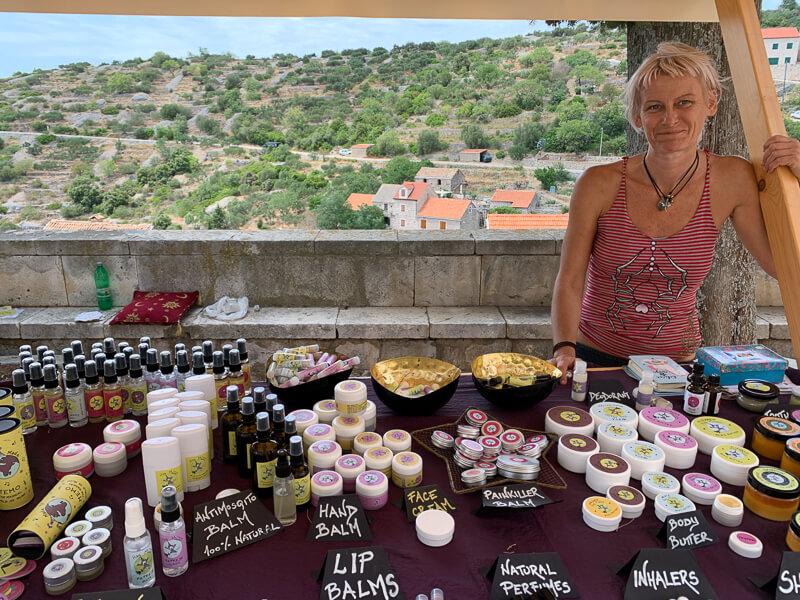
Ivana Magdalenić with some of her products at Hvar’s annual lavender festival.
Ivana Magdalenić made her first remedy eight years ago to help a friend with a foot injury. After lots of research and tinkering with a recipe, she found the right mixture that healed her friend’s wound. Ivana realized she had a knack for working with plants and she went on to create a natural product line that treats a range of issues—from acne to burns, wounds, scars, psoriasis, wrinkles, joint pain, and more.
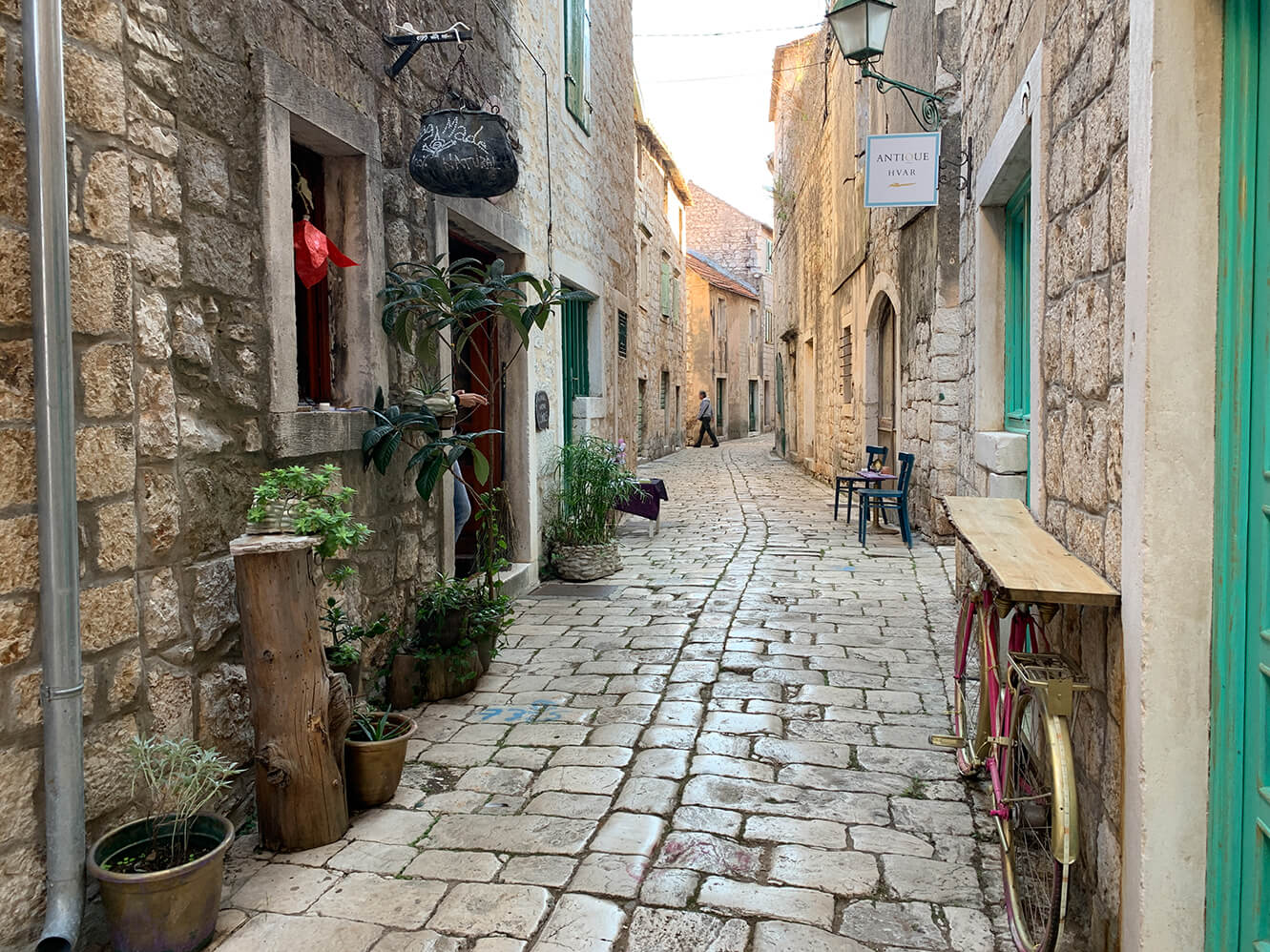
Ivana sells her complete line of Hag-Made products at her shop in Stari Grad, Hvar.
Her company name, Hag Made, is a charming wordplay on hand-made and was inspired by a dream about witches brewing over a cauldron. In this narrative, Ivana is a “good witch” who creates healing potions from the heart. I used her Kantarion Plus on some acute burns and within a few days I stared at my skin in disbelief at the marked difference in appearance along with the pain relief. Her Smilje cream gave my skin that Cro dewiness overnight.
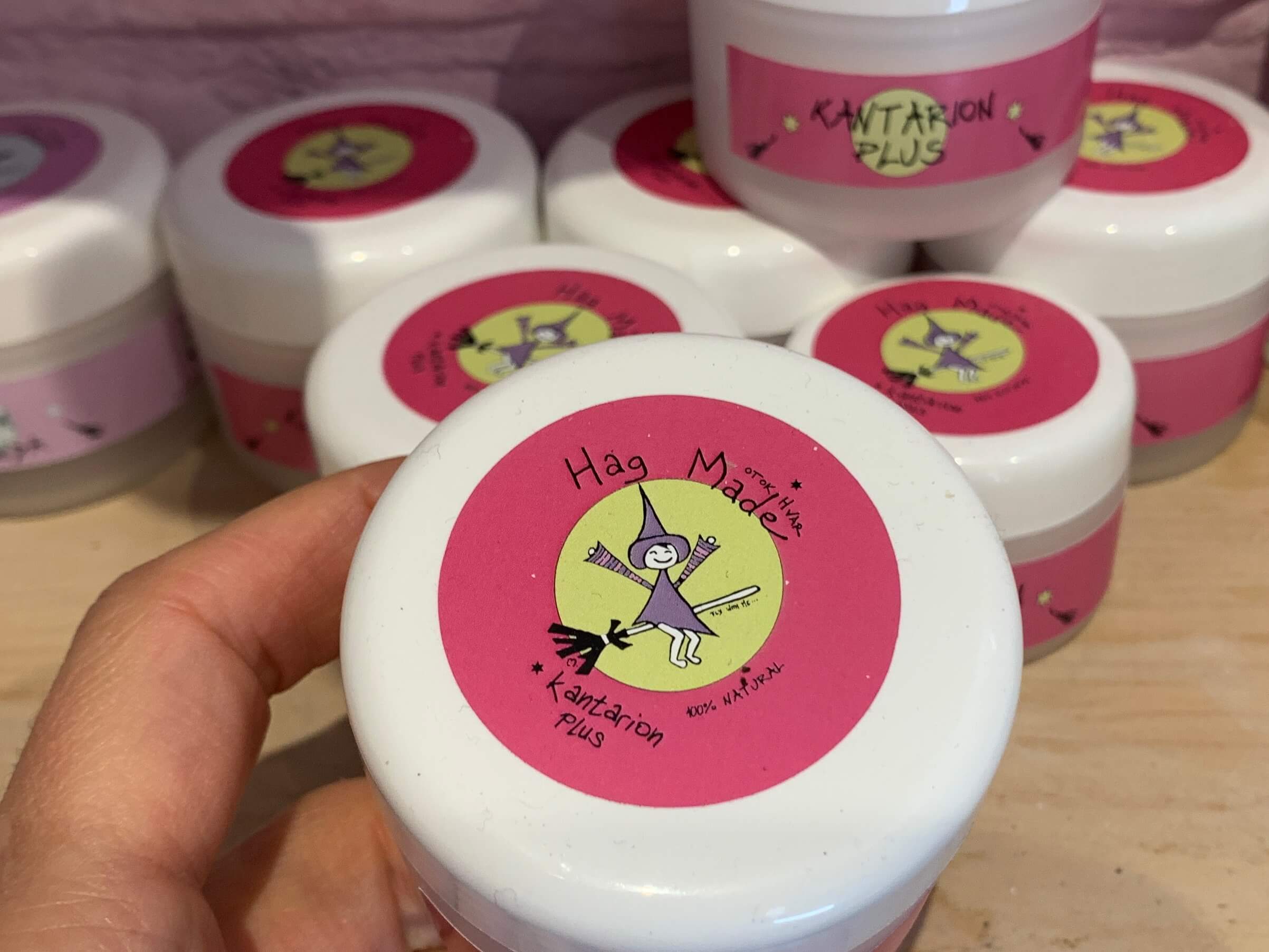
Hag-Made Kantarion Plus has strong anti-inflammatory properties and worked miracles on the author’s badly burned skin.
Everything Ivana uses grows naturally on Hvar, where she’s from, and she knows the difference between a plant that comes from the south side of the island where the sun is more intense versus plants on the north side. It’s an important distinction because product quality and effectiveness are priorities; nothing is sold without being tested. She’s part artist, musician, inventor, and free spirit who seems to have a special connection to the earth’s energy, which undoubtedly guides her business.
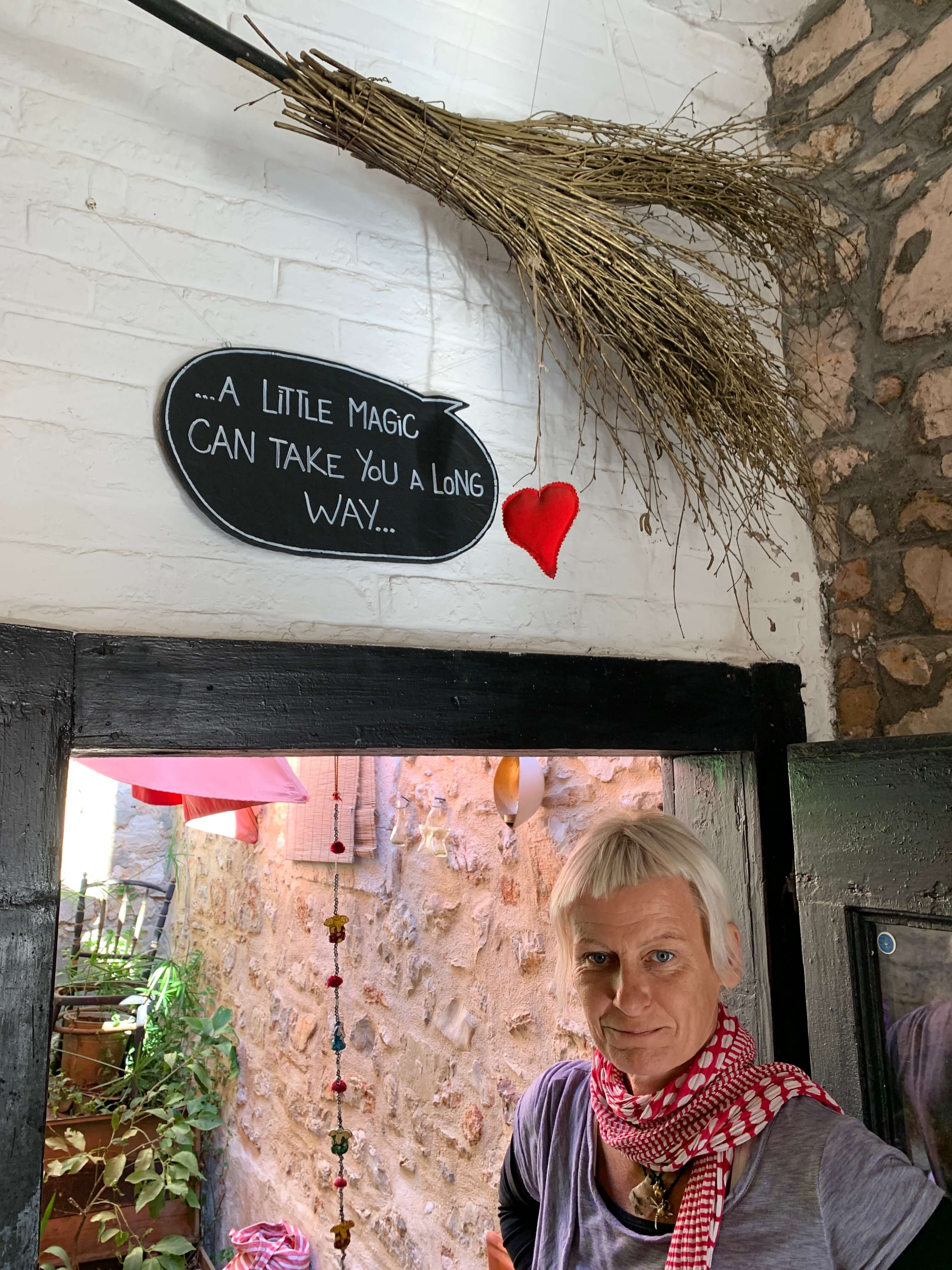
Ivana in her shop, near the door leading to the outdoor garden where she enjoys coffee and the company of friends.
Grandma Ruža
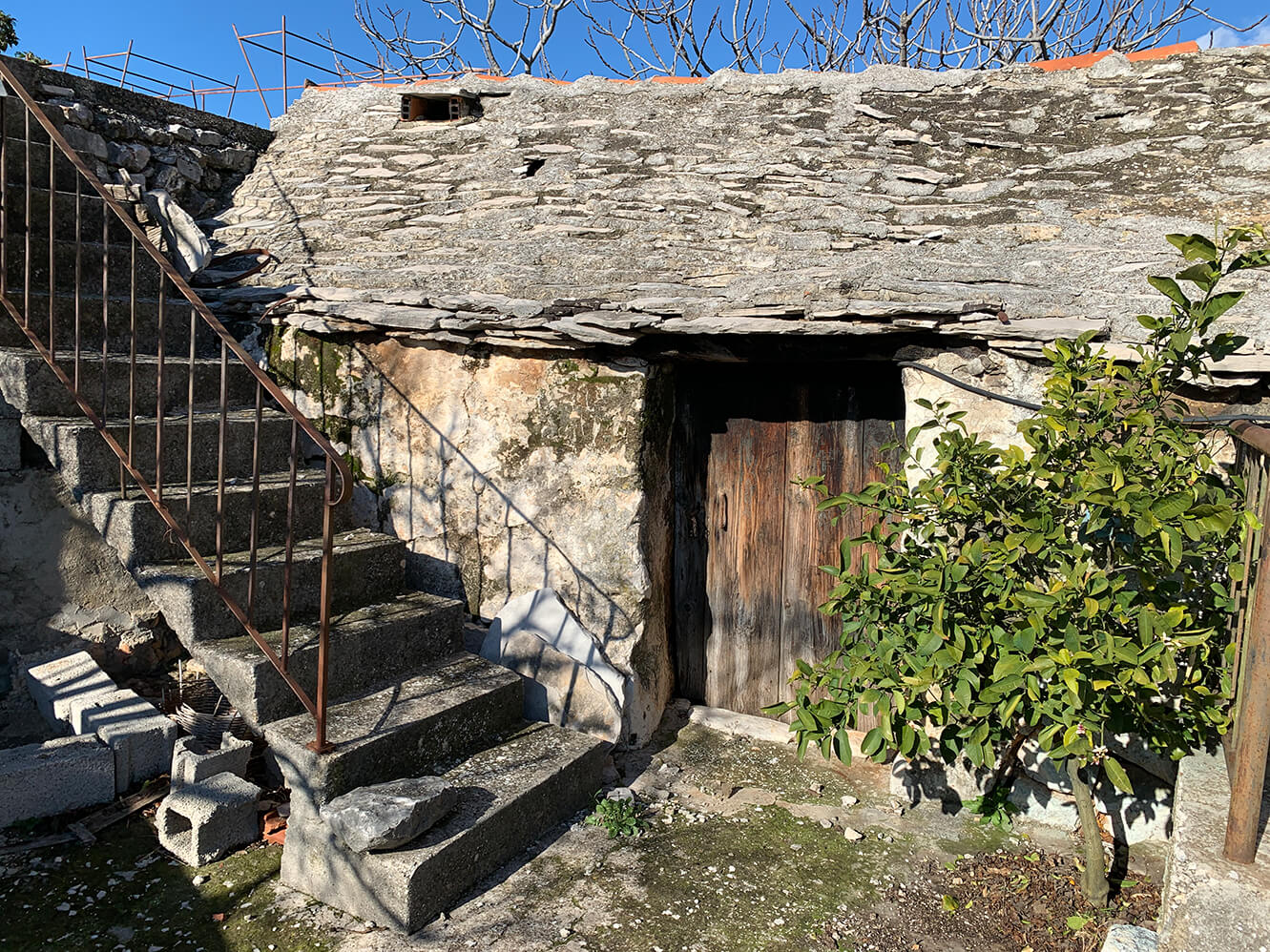
Grandma Ruža’s childhood house in Gustirna, near Trogir.
Conversations about healing often include somebody’s grandmother and Grandma Ruža is a queen. She’s been making oils and creams with kantarion, smilje, and nevin (calendula) for decades. She administers these for sunscreen, sunburn, wounds, hemorrhoids, cuts… for anything, she tells me. She’s been known to pan-fry dried chamomile flowers in olive oil to make chest wraps for reducing colds and inflammation, and she brews tea from various herbs to improve assorted ailments. To relieve her rheumatism, Grandma Ruža visits a secret location on Šolta where she smears the black mud on her entire body and face; home-made rakija infused with herbs helps too. Funny.
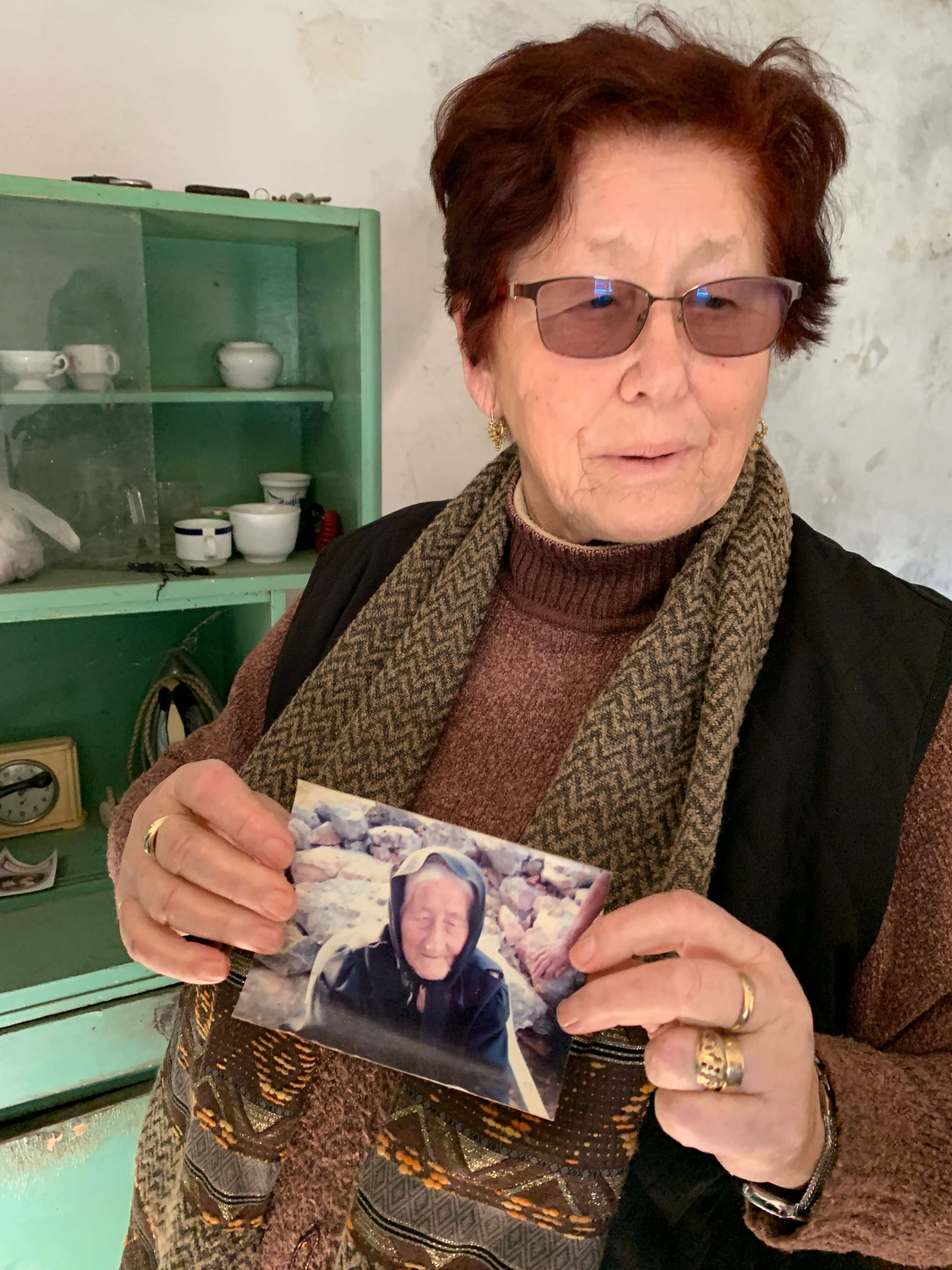
Grandma Ruža with a picture of her mother.
Her range of knowledge comes from life experience. Growing up at the end of World War II in the countryside near Trogir, people in the villages survived off agriculture. She was on the front line with her mother for handling plants and animals and producing a long list of food—meat, cheese, vegetables, oils, herbs, wine, and brandy. When Grandma Ruža quit school at age 10 to work and help take care of the family, her hands-on education on plant medicine began too.
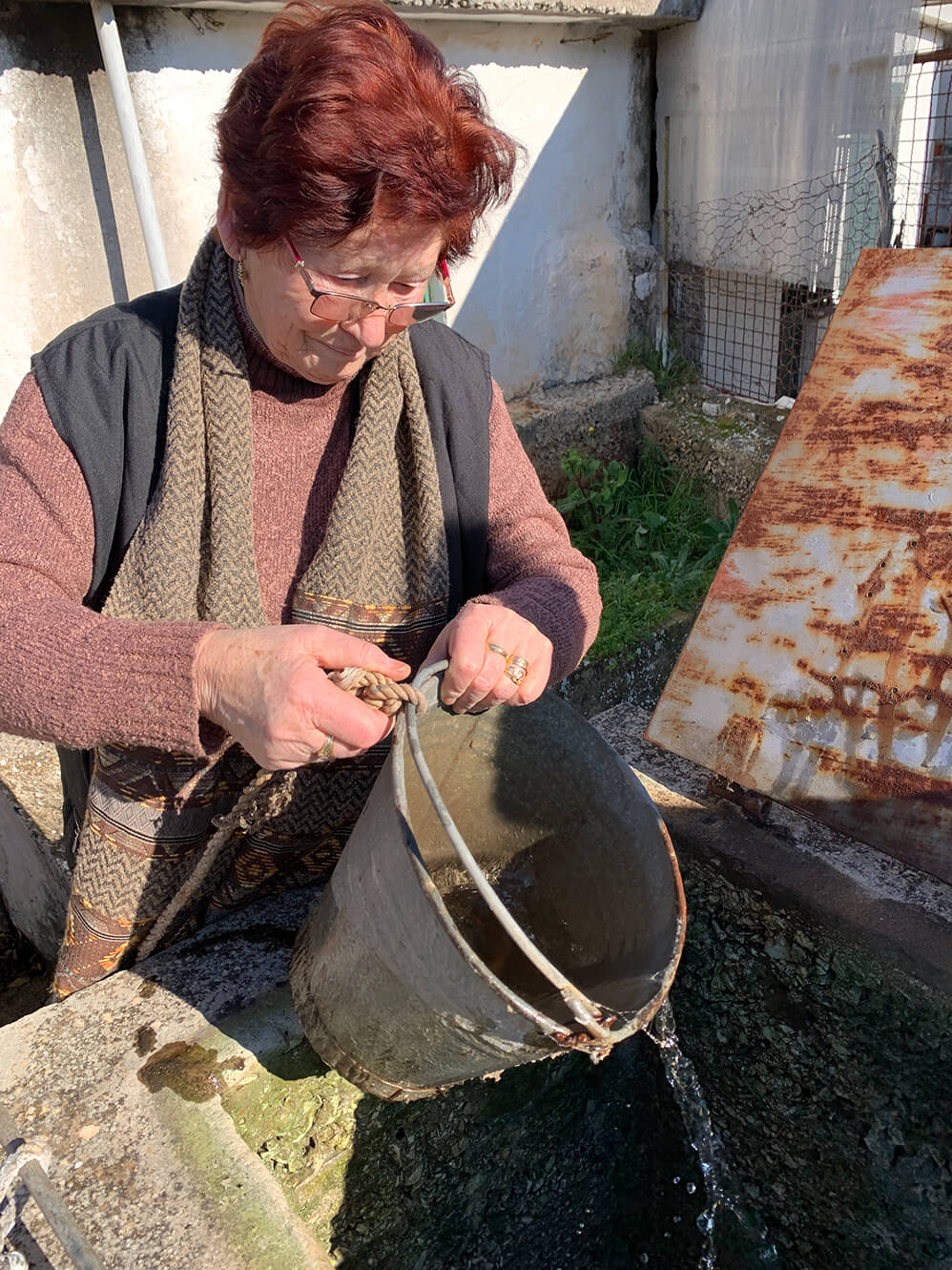
Grandma Ruža cleaning up in the yard around her childhood home.
She regularly picked sage, immortelle, and wormwood, and tree fruits including oskoruša (used as medicinal tea for stomachaches and constipation) and maginje (a Croatian “strawberry” containing high amounts of vitamin C and dietary fiber)—some of the more direct healing plants. Today, she’s still going strong and the family still benefits from her preparations.
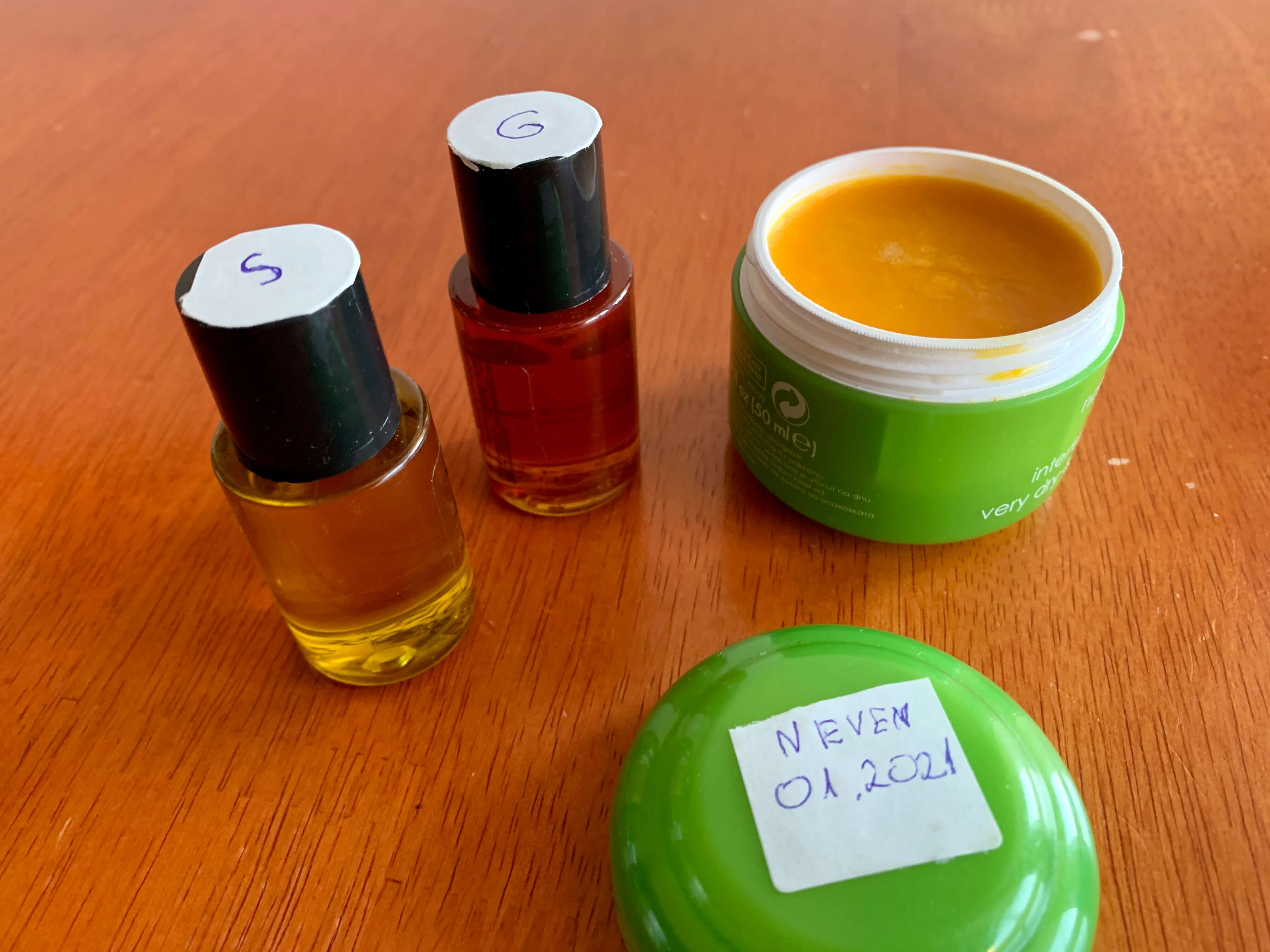
Recycled containers come in handy for Grandma Ruža’s homemade oils and balms, which the whole family uses.
Natural fortunes
Not many places in the world have Croatia’s diversity or abundance of natural resources that provide food, nutrition, and healing. I’m not sure how many Croatians realize their good fortune in this regard, but it seems obvious to me, and it feels like I’m constantly learning about a new food or plant here that provides some benefit.
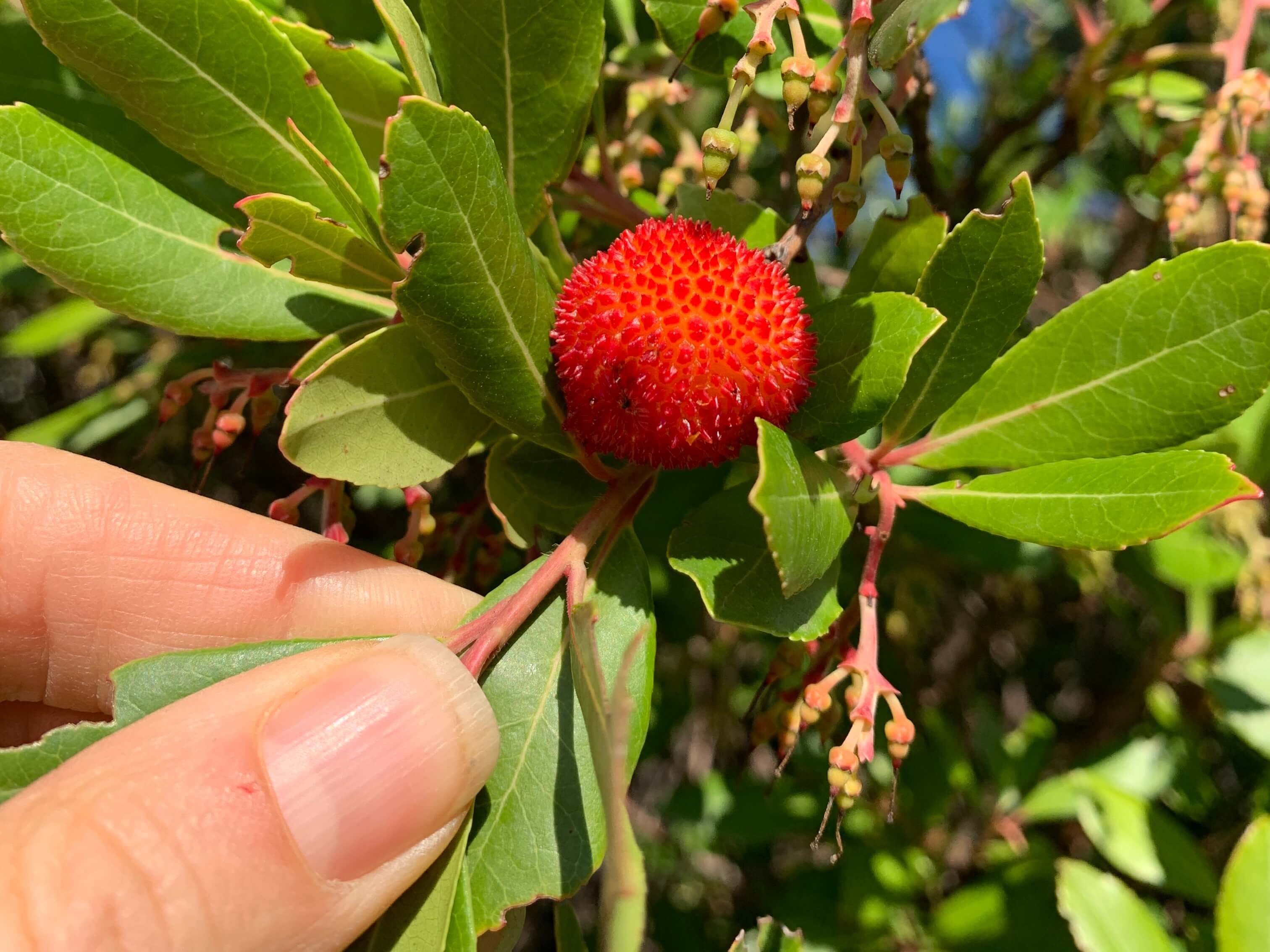
Maginje fruit are called Croatian strawberries. Although the shape, texture, and taste are different from typical garden strawberries, their health benefits are similar. Unlike the garden variety that grows in plants low to the ground, maginje grows wild in trees and in great quantity.
To be able to produce food with readily available, indigenous vegetation, animals, and other means AND nourish your body (hello Mediterranean diet) AND heal your ailments, seems like a triple win. I’m glad to have found Croatia’s natural wellness; to my mind it enhances everyone’s prospects for healthy living.
For more of Cyndie's experiences, check out her Croatia Through the Eyes of a Digital Nomad column.
Are you an expat in Croatia who would like to share your experiences during the pandemic in Cyndie's video series? If yes, please contact her on This email address is being protected from spambots. You need JavaScript enabled to view it.
We are also keen to interview any digital nomads who have successfully applied for the new visa, after the first success in Istria - Meet Melissa Paul, Owner of Croatia's First Digital Nomad Visa. Please contact us on This email address is being protected from spambots. You need JavaScript enabled to view it. Subject Nomad Visa.
Digital Nomads Seen as New Development Opportunity for Croatian Tourism
ZAGREB, 3 Sept 2021 - Croatia is an ideal destination for digital nomads who are provided with a quality internet network in our country and can enjoy its fascinating scenery, pleasant climate, and overall safety, and this is a new development opportunity for Croatia's tourism, Minister Nikolina Brnjac said on Friday.
The tourism minister Brnjac underscored that digital nomads contribute to year-round tourism.
An estimated one billion people will be teleworking in 2035 and a significantly higher number of digital nomads are expected in the next period, she underscored at a conference organised by the Novi List daily in the seaside resort of Opatija .
Director of the Croatian National Tourist Board (HTZ) Kristjan Staničić underlined that an estimated 17 million people are digital nomads.
A joint campaign by the ministry and tourism board was launched this spring in an effort to promote Croatia's comparative advantages for digital nomads, primarily on the British market, followed and later on the markets of the USA, Canada and Russia.
200 applications for digital nomad status in Croatia
That has resulted in about 200 applications for digital nomad status in our country, said Staničić.
Croatia is one of the first EU countries to regulate a one-year temporary residence status for nomads. Cooperation between the ministries of tourism and of the interior has resulted in a series of laws being adapted related to digital nomads.
Interior Ministry State Secretary Terezija Gras recalled that the Law on Aliens had been amended to introduce digital nomads as a new category eligible for temporary residence. Conditions of eligibility have been entirely simplified and have cut unnecessary red tape, she said.
They have also been exempted from dual taxation payments and health insurance issues have also been regulated.
Digital nomads from Croatia and elsewhere presented their views and experiences at the conference.
For more news, CLICK HERE.
Checking in with Dubrovnik Digital Nomads-in-Residence – Zoltan Nagy Interview
May 17, 2021 – Among Dubrovnik digital nomads is also Zoltan Nagy, a Hungarian photographer, videographer, and a really cool person. He told us about his impressions of the city and the life of a digital nomad.
Zoltan Nagy is a landscape photographer, videographer, and web designer. He is not too far away from home in Dubrovnik as his homeland of Hungary is one of the neighbouring countries to Croatia. In fact, he considers Croatia one of his favourite foreign countries. He is a young digital nomad looking to explore the world and immortalize it in his photographs. One of the things that excited him the most about the Dubrovnik Digital Nomads-in-Residence program is meeting like-minded individuals and working with them on the common goal.
DNiR Program
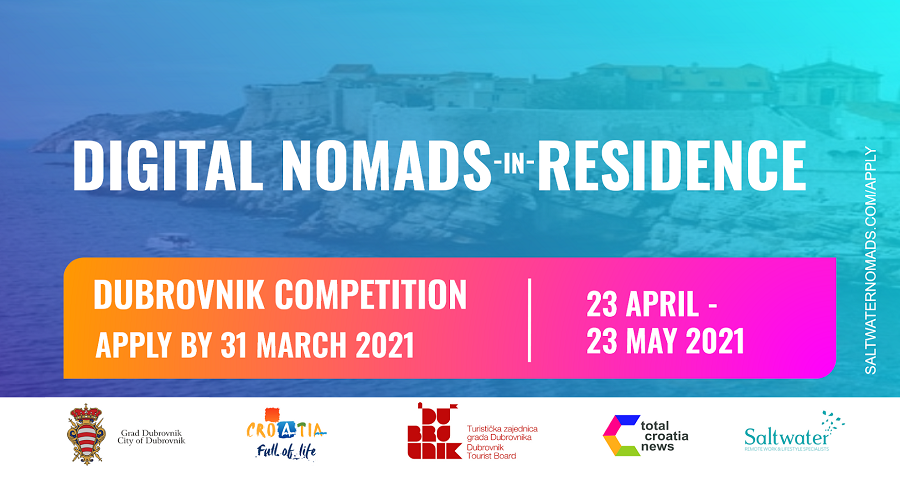
The Dubrovnik Digital Nomads-in-Residence program is the work of Saltwater Nomads in partnership with Total Croatia News. The Dubrovnik Tourist Board and the City of Dubrovnik support the project and make it possible. The program is a co-creation effort looking to utilise the experiences of ten digital nomads combined with local community members. The goal is to create a strategic direction for the city through the use of design-thinking workshops. It represents a step towards re-thinking Dubrovnik's tourism sector.
The Interview
Zoltan is always upbeat and ready to help. We’ve taken advantage of this and asked him a few questions about his experiences in Dubrovnik. He is very happy with the life in the city and the people he met along the way.
“I love it so far! We’ve met quite a lot of local people here and they were just so nice. They showed us around, gave us some tips and tricks on where to eat, where to find nice photo spots. And of course, the Old Town is just amazing.”
So, what does a person with such a positive outlook on Croatia and Dubrovnik find to be the most challenging thing for digital nomads here?
“The only challenge I found here is the accommodation. So, as a digital nomad, I of course have a monthly budget I can spend on food and just living in a place, and I couldn’t find really good deals in terms of accommodation here…”
Check out the full video below.
Saltwater Nomads' Tanja Polegubic on Dubrovnik Digital Nomad-in-Residence Program
Dubrovnik Mayor Mato Frankovic on Digital Nomads, US Flights, 2021 Season
Winners announcement video:
Learn more about the Dubrovnik Digital Nomads-in-Residence program.
Checking in with Dubrovnik Digital Nomads-in-Residence – Alyssa Isogawa Interview
May 12, 2021 – The Dubrovnik Digital Nomads-in-Residence (DNiR) program is in full swing. Today we are catching up with Alyssa Isogawa to get her view of the program and living in Dubrovnik.
What ties a young Californian of Japanese descent to Croatia? Well, water polo, of course. Alyssa Isogawa is anything but typical. This charming Californian from Huntington Beach spends her days working on her e-commerce brand Deep End she started at the age of 19. Her brand sells clothing, among other things, for water polo players. She also enjoys playing her guitar, dancing, and revelling in all things tied to the sea and water. She is a proud vegan and loves to meet new people.
Why did Alyssa Apply?
An interesting detail about Alyssa's introduction video is her love of water polo. Many think of this sport as exotic or uncommon. Not Croatians and certainly Dubrovnik locals. Water polo is a beautiful, albeit physically demanding sport enjoyed by many around the world. It is especially popular around the Mediterranean and in some central European countries. Croatia is one of the most successful countries in the history of the sport and Dubrovnik is one of the most important European water polo centres. It comes as no surprise Alyssa knew about Dubrovnik way before the Dubrovnik Digital Nomads-in-Residence program. As an aspiring digital nomad, she wasted no time applying to the program. After the initial selection process, Alyssa Isogawa is now enjoying her time in Dubrovnik, exploring the city and learning about local culture.
Her experiences will be a valuable asset to the program as DNiR is all about envisioning ways in which Dubrovnik could improve its offer for people like her. It was designed by Saltwater Nomads in partnership with Total Croatia News. The program is a collaboration between the City of Dubrovnik and the global digital nomad community it hosts, all done with great help from the Dubrovnik Tourist Board as well. The DNiR program is bound to produce interesting and valuable results that could have a real impact on the local community.

This is one of the things high on Alyssa’s list as well. She enjoys the connection with the new culture and is looking forward to making new friends. In our interview below she states:
“Everyone here has been super friendly. I just walk down the street and people want to talk to me, which is so weird coming from LA…”
“Everyone here is just so willing to help you, wants to talk to you… and make sure to let you know that Croatia is an amazing place.”
Of course, not everything is perfect. There are areas that need improvement.
“I love Croatia so much, I love the people, and the only thing that has been super difficult is being a vegan here. Yeah, I would have to say I’ve had to ease up on my vegan-ness…”
Check out our video interview below and find out what Alyssa likes and dislikes about her Dubrovnik experience.
Learn more about the Dubrovnik Digital Nomads-in-Residence program.
Saltwater Nomads' Tanja Polegubic on Dubrovnik Digital Nomad-in-Residence Program
Dubrovnik Mayor Mato Frankovic on Digital Nomads, US Flights, 2021 Season
For the latest digital nomad news from Croatia, follow the dedicated TCN section.
The winner announcement video:
Split Digital Nomads Increasing Daily: ‘It’s Great Here, We Feel Safe’
May 12, 2021 - Split digital nomads are increasing daily thanks to the coastal city's quality offer, international community, and safety.
They come from all over the world, live with complete freedom of movement, work from home, a cafe, or a distant island. When choosing a location, the most important condition is a fast and quality internet connection, hospitality, and security. They are digital nomads, highly qualified foreigners, mostly IT experts, who are increasingly discovering Croatia as a unique piece of paradise on Earth, and Split seems ideal for their needs, reports Slobodna Dalmacija.
Thanks to amendments to the Aliens Act, Croatia has introduced the concept of digital nomads since the beginning of this year, who now have preferential tax treatment, which facilitates their decision to choose Croatia as their place of residence and work.
They can stay in Croatia for up to a year. The introduction of digital visas for digital nomads was initiated by entrepreneur Jan de Jong, a Dutchman who lives and works in Split. More and more people work remotely, and he sees this as an opportunity for the Croatian economy.
He is the co-founder of the Croatian Digital Nomads Association (DNA) with Tanja Polegubić, a returnee from Australia who has also been living and working in Split for several years. The association's main goals are to provide general information to digital nomads about life and work in Croatia, educate, connect digital nomads with service providers, and present their problems to the authorities.
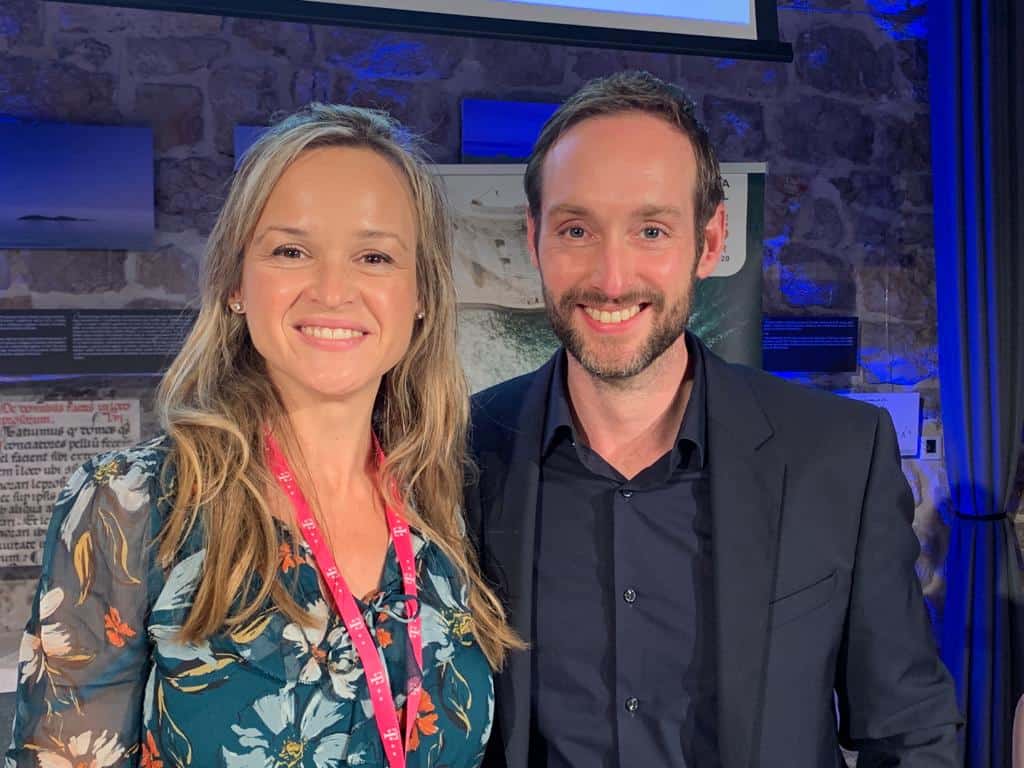
"Split is already a natural choice for many digital nomads, just like other cities on the coast. But that could change if some changes don’t happen, that is, if the city doesn’t open up to digital nomads. When I was looking for a coworking space to work in 2015, I searched the entire Adriatic coast.
I spent a lot of time in Zadar, Trogir, but Split attracted me especially. There is something in it. Everything suits me here: it is neither too big nor too small. There are a lot of quality restaurants and bars, and there is a big international community. At the same time, the locals speak English well," says Tanja, owner of the company "Saltwater," an aid to digital nomads as it provides everything one may need, from finding a workspace, connecting people, organizing conferences, various events, conferences and more, and is a member of the Business Incubator of the Croatian Chamber of Commerce of the Split County Chamber.
Tanja said that digital nomads in Split work from home, i.e., from rented apartments, hostels, hotels, or coworking spaces in several Split locations.
"This has been an interesting year, and I have befriended many people who have stayed in the city. Most like to live in a circle around the city center and in the Palace. Varoš, Bačvice, Meje are popular with them ... in fact, those neighborhoods from where they can reach the city center on foot in a short time. They mostly stay in private apartments and less in hotels because they are too expensive for them.
But the problem is the short rent they get from private renters who, of course, find it more cost-effective to give the apartment to a typical tourist rental that is expensive for nomads. Even the off-season offer of social life, which weakens after the summer, does not favor the arrival of nomads for whom the social aspect is important, the offer of the destination where they stay, the diversity of content around them because they want to meet new places and people. True, there was a pandemic that disrupted everything, but we need to adapt.
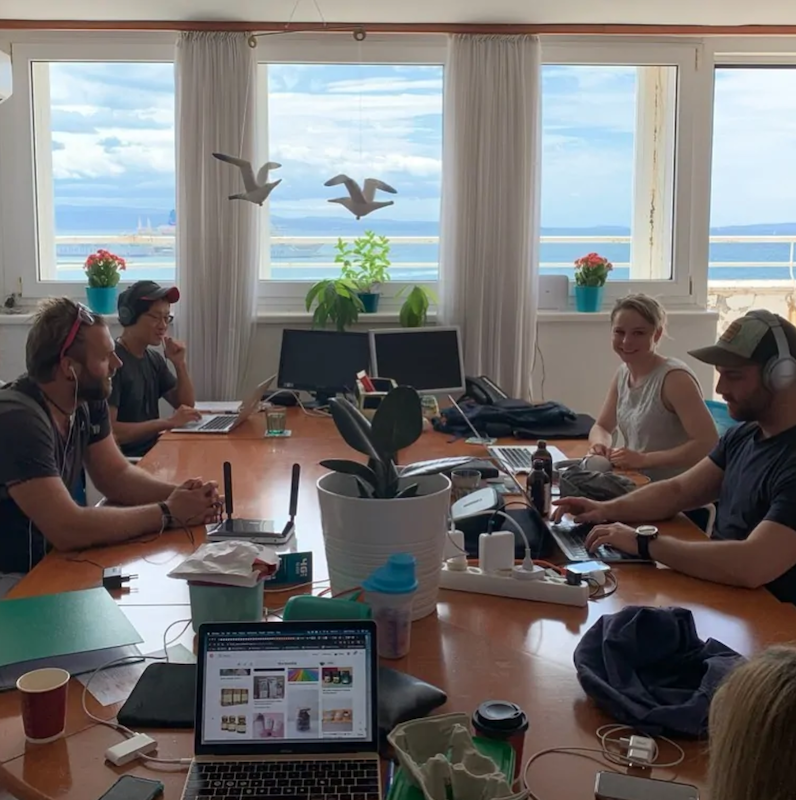
On the other hand, this environment is quite interesting for them because of their hospitality and security, especially for families with children, the health system has a good reputation, the climate is mild," says Tanja, who receives many inquiries about Croatian cities from digital nomads. The conditions they need to meet are proof of constant income, proof that they are digital nomads, that is, that they are not coming to Croatia to sell something but to do their job from this destination.
To help foreigners come to Croatia, a DNA association was established.
"The goal is to support digital nomads - as well as local businesses. The association deals with information, education, community networking, certification, and representation of digital nomads and various businesses before various Croatian institutions. Ways are being devised in which digital nomads can contribute to society, for example, around animal welfare or environmental protection.
It also focuses on tenancy topics because we know that many tenants and students are evicted from rented apartments when the tourist season begins. We will organize "certified" service providers so that digital nomads know that they will be protected," says Tanja Polegubić, believing that Split and Croatia have an excellent chance of becoming one of the favorite destinations of digital nomads if they open their hearts.
While Dubrovnik has gone the furthest in this regard, Split is also turning towards such modern trends. For example, the Split hotel "Marvie" offers affordable packages for long-term stays. As much as a 50 percent discount for stays of 28 days or longer, even in the middle of the summer season. Guests have at their disposal a separate co-working space with high-speed internet of 200 Mbps, a projector with a screen and a flipchart, which can simultaneously fit 7 people, ergonomic chairs, and everything that makes the stay more comfortable.
Namely, teleworking is a growing trend with exceptional economic potential, which is supported by predictions that by 2022 there will be more than 1.87 billion workers in the world whose work will take place online regardless of location. Therefore, "Marvie" is the first Croatian hotel to create an offer fully adapted to the needs of teleworkers.
Jan de Jong points out that digital nomads are an opportunity that we must not ignore. The main advantage for Croatia is year-round tourism and the arrival of highly paid workers who would not take jobs and spend their salaries in Croatia.
"Digital nomads and marketing are important for Croatia because they share their experiences, videos, and photos with their families, but also on social networks, which is free promotion. Since the introduction of visas, 33 of them have applied, and four have been approved, while the rest are being considered," he said.
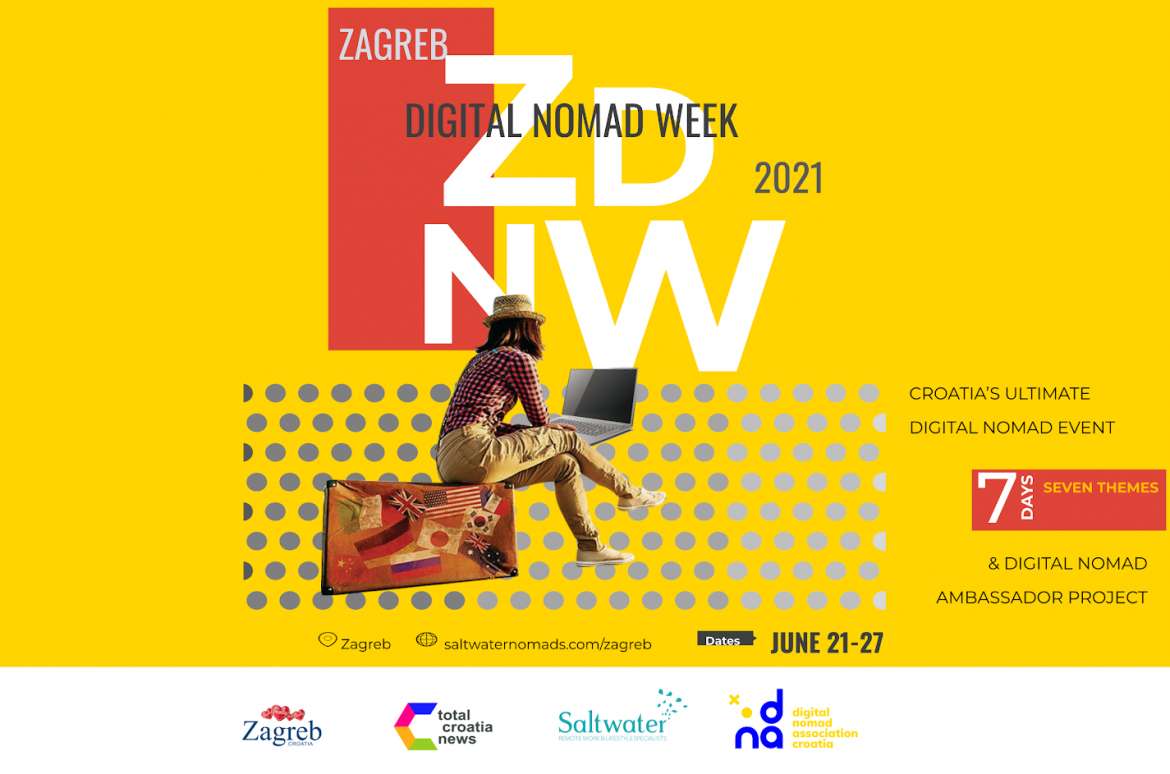
Learn more about Zagreb Digital Nomad Week 2021 Announced by Saltwater Nomads/Zagreb Tourist Board HERE.
Learn more about the Dubrovnik Digital Nomads-in-Residence program
Saltwater Nomads' Tanja Polegubic on Dubrovnik Digital Nomad-in-Residence Programme
Dubrovnik Mayor Mato Frankovic on Digital Nomads, US Flights, 2021 Season
For the latest on digital nomads in Croatia, follow the dedicated TCN section.
Checking In with Dubrovnik Digital Nomads-in-Residence – Kelsey Kay Love Interview
May 8, 2021 - Dubrovnik Digital Nomads-in-Residence program is well underway with our digital nomads seriously getting to work on ideas and suggestions on how to improve the local nomad offer. We caught up with Kelsey Kay Love to get her opinion of living and working in Dubrovnik.
Digital nomads in residence are creating and sharing their vision of a nomad-friendly Dubrovnik. They are paving the way for their colleagues who will follow after them. We are catching up with them and chatting about their impressions so far. Today, we are talking to Kelsey Kay Love.

It is hard to imagine a group of people that wouldn't want Kelsey as one of their members. This Dallas Texas born digital marketing expert, travel writer and brand manager lives life to the fullest. She is a world traveller with a gift of contagious positivity. Kelsey is currently busy working as a brand manager for SelvaRey Rum Company, co-owned by Bruno Mars. That didn't stop her from applying to Dubrovnik Nomads in Residence program.
After searching for digital nomad options around the world she realised there was a possible option for applying to a program in Dubrovnik. Croatia was already high on her bucket list as a destination so she decided to apply. And the rest is history.
Living in Dubrovnik
Although she works full time Kelsey manages to enjoy Dubrovnik. She spends her days getting to know the local culture of living and local people. She enjoys activities and tours done with her fellow nomads in residence and is rapidly building a good understanding of what it's like to live and work in southern Croatia. Being a lover of boats, Kelsey is right at home in this ancient seafaring community.
In a short interview below Kelsey reveals her likes and dislikes when it comes to being a digital nomad in Dubrovnik. She also chimes in as to what the next steps for the local community need to be. Her varied list of interests helps her enjoy the width of the Dubrovnik experience and some of the things the area offers outside of the beaten path. Check out the interview below and pick up some of that Kelsey Kay Love positivity.
You can learn more about the Dubrovnik Digital Nomads-in-Residence program here.
Here is Kelsey's application video.
Saltwater Nomads' Tanja Polegubic on Dubrovnik Digital Nomad-in-Residence Program
Dubrovnik Mayor Mato Frankovic on Digital Nomads, US Flights, 2021 Season
For the latest digital nomad news from Croatia, follow the dedicated TCN section.
More Room Needed in Šibenik's Trokut Center: Nomads Have Arrived
April 10, 2021 - The Trokut Center for New Technologies and Entrepreneurship in Šibenik has become a place that brings together young entrepreneurs from Croatia the world.
Šibenski Portal reports that there are currently six digital nomads there, while there are 33 tenants in the coworking space. A total of 18 companies uses the premises. Trokut is worth 28 million kunas and was built and equipped with co-financing from the European Regional Development Fund. The City of Šibenik received 20 million kunas in grants.
The Trokut Center was recently nominated for the Association of Croatian Architects award, Viktor Kovacic, for the most achievement in all architectural creativity areas in 2020.
"The center currently employs three people, as our goal is to encourage students to get involved in the Trokut Center itself. Last week we released a call to students who have free time to help us with our daily work in the center", says Diana Mudrinic, Director of the incubator for new technologies, the Trokut Center.
Currently, the Trokut Center's capacity is complete, and the free space around 90%. The company is striving to expand the reach currently built on two floors with a total area of more than 2,000 square meters. The center has 28 flexible spaces of workshops, offices, and cabins.
"For now, our customers are mainly in the IT industry. We can offer them a comfortable environment, workplace, desk, and colleagues to help them develop their businesses. I would especially like to point out our entrepreneurial incubator. We released a public call where the goal is for two months, for enterprising beginners to learn absolutely everything they need for business and their products. In the end, judges will choose to award the top 3 ideas, where the first place gets 50, the second 30, and the third 20 thousand kunas", says Mudrinic.
The Trokut Project, worth almost 28 million kunas, the city of Šibenik received 20 million kunas from the European regional development fund. European investment in Šibenik should also attract users from all over the world and be financially sustainable.
"Digital nomads are one direction in which the Trokut Center is heading towards, and we already have them now. Some of our guests are from Latvia, India, and the Netherlands. The Digital Nomad trend is slowly but surely moving, and our goal is to become one central place for digital nomads where we can help them apply for digital nomad visas. The goal is to be self-sustainable in 3 years, according to the project rule."
The purpose of the project is to develop innovative entrepreneurial and business infrastructure for the provision of new and better services. The aim is to encourage the growth and development of small and medium enterprises and create new jobs in Šibenik-Knin County.
Ivana Juran Magdic, from the project office in shipbuilding Levant, has her workspace in Murter but still decided to use The Trokut Center's space. "It’s very comfortable. It’s close to everything, and everyone is thrilled, from business partners, clients, and so on. I was afraid of what a coworking area will look like as I've never done that, I've been alone in the office for 12 years, so this is a new experience. It encouraged me to keep the business going", said Magdic.
Franka Bujas, the F5 graphic design services business owner, found The Trokut Center to be a comfortable place to work in. "At first, I was working from home, looking and thinking of a space like this. However, when the Trokut Center was made, I was unsure, but the decision was made when I came here and saw what everything looks like and what it has to offer. I was thrilled, so I decided to come here. It is fully equipped for all my needs, the meeting room that is important to me looks professional. I think this is ideal for all beginners and, more specifically, larger companies."
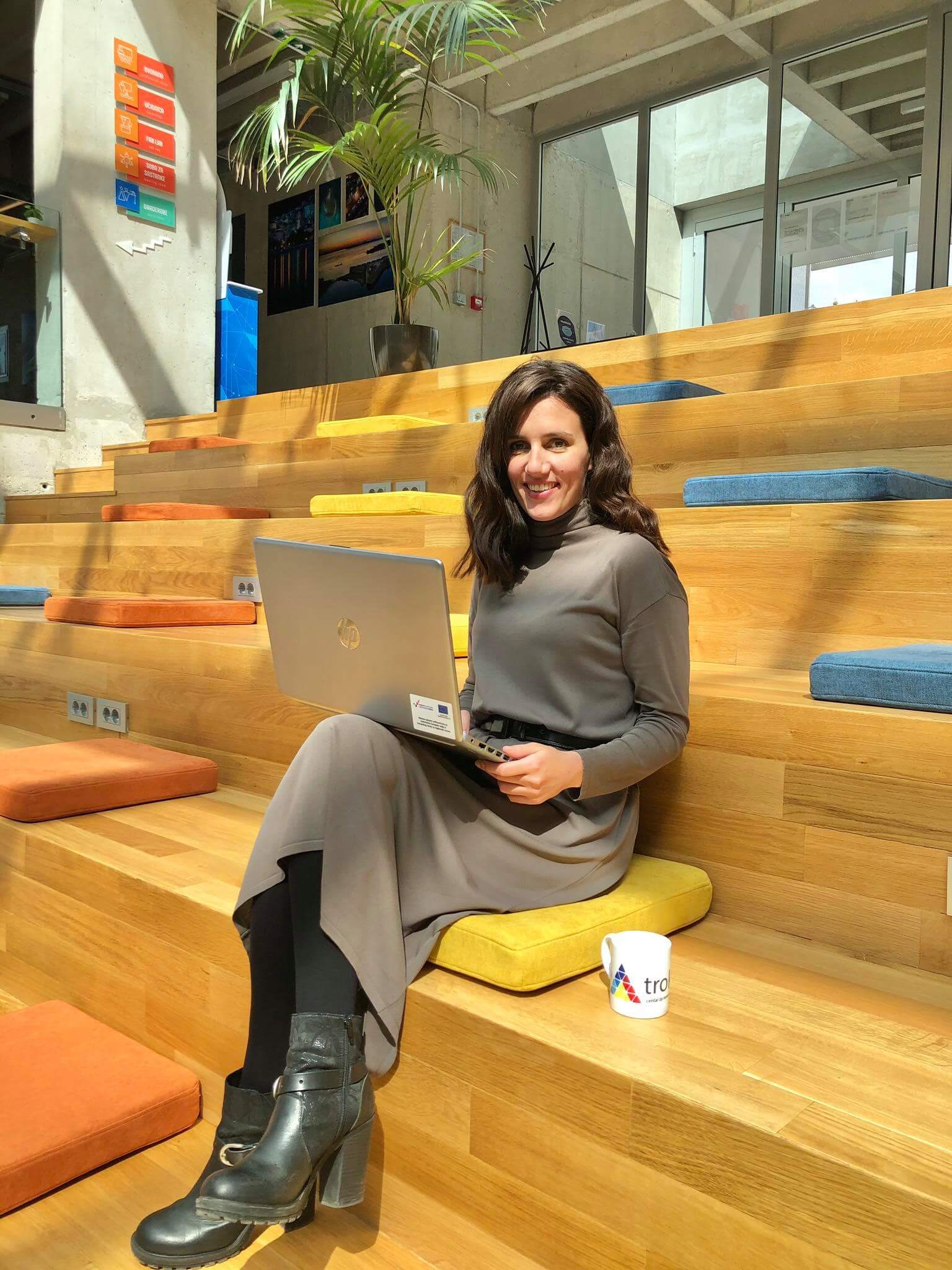
Franka Bujas founder of F5 via Trokut Šibenik - Inkubator za nove tehnologije Facebook
Franka found friends in the Trokut Center who are an additional plus to that space in the space itself and the working conditions. "The working atmosphere is great, and people are young, the atmosphere is motivating. The staff is great, and they are always available for whatever is needed."
At the opening ceremony, Diana Mudrinic, Director of the incubator for new technologies, the Trokut Center, stated the Trokut Center is the home of new generation entrepreneurs and expressed hope that Šibenik would soon become the central place of the IT community in Croatia.
For more about made in Croatia, follow TCN's dedicated page.
Croatian Tourist Board Promoting Croatia as Attractive Destination For Digital Nomads
ZAGREB, 10 March, 2021 - The Croatian National Tourist Board (HTZ) has launched a new promotional campaign "Croatia, your new office!" with the aim of promoting Croatia as a suitable destination for digital nomads.
As part of the campaign a special landing page Croatia your your new office was created in English on the Croatia.hr website together with the Ministry of Tourism and Sports, which contains all the important information related to the permit application process and stay of digital nomads in Croatia, the HTZ says.
At the end of November 2020 the Croatian parliament adopted the Aliens Act, which entered into force at the beginning of 2021 and the legislation enables digital nomads to be granted temporary residence in the country for up to a year.
"Croatia is one of the first members of the European Union to regulate a one-year temporary stay for digital nomads, and this is the result of the cooperation between the Ministry of Interior, Ministry of Foreign and European Affairs, Ministry of Health, Ministry of Finance and Ministry of Tourism and Sports," Tourism Minister Nikolina Brnjac was quoted as saying.
"Digital nomads are an excellent opportunity for the Croatian economy, and we are pleased with the fact that digital nomads are showing increased interest for numerous Croatian cities," the minister said, adding that she is sure that Croatia will impress digital nomads with its natural scenery and cultural heritage.
"I wish all current and future digital nomads a warm welcome to one of the most desirable and unique European destinations - Croatia," Brnjac said.
"Croatia is a country where English is widely spoken, a country that offers a unique way of life with authentic experiences, has a good internet connection, favourable climate and beautiful natural surroundings, good proximity and is easily accessible to the rest of Europe, highly affordable compared to European standards and good and affordable healthcare," the HTZ Director Kristjan Staničić said.
"The above has also been recognized by many foreign media outlets, including the world's leading brand of travel guides Lonely Planet which dedicated a recent article to the topic of digital nomads and the conditions that foreigners must meet to spend a year in Croatia as digital nomads, while the reputable magazine Forbes, in both the French and American editions, published an article about our country as a desirable and open destination for digital nomads. Also, many American media list Croatia and Dubrovnik as extremely desirable destinations for digital nomads," the HTZ says on its website.
For more about digital nomads in Croatia, follow TCN's dedicated page.
Health Insurance for Digital Nomads in Croatia is Now Enabled
February 20, 2021 – Digital nomads in Croatia have the right to health care, as the issue of health insurance for digital nomads in Croatia is now regulated.
As HRturizam reports, on Thursday, the Government sent amendments to the Law on Compulsory Health Insurance and Health Care of Foreigners in the Republic of Croatia to the parliamentary procedure. They are harmonized with the Aliens Act to regulate the manner of exercising the right to health care for digital nomads. The amendments thus enable the realization of the health care right for digital nomads.
By the official definition, a digital nomad is a third-country national who is employed or doing business through communication technology for a company or their own company that is not registered in Croatia and does not do business or provide services to employers in Croatia and has been granted temporary residence in Croatia.
As Health Minister Vili Beroš explained, a digital nomad is not obliged to apply for compulsory health insurance. Still, they are obliged to bear the costs of using health care in a health institution, i.e., with a private practice health worker or other health care provider in Croatia.
By amending the Law on Foreigners, Croatia has introduced the concept of digital nomads who now have preferential tax treatment. Legal changes regulate the tax exemption for receipts of digital nomads – foreigners who work online from Croatia for other countries' employers.
The new Law on Foreigners for Digital Nomads prescribes a tax exemption for their income based on the status thus acquired. All this to facilitate their decision to choose Croatia as a place of residence and work.
This way of regulating their stay in Croatia assumes that digital nomads will spend their earnings here while living in our country and thus positively impact the domestic economy.
Temporary residence is granted for up to one year (possibly shorter). However, the temporary stay cannot be extended. A request for re-regulation of the digital nomad's stay may be submitted six months after the digital nomad's temporary stay expiration.
As Jan de Jong, the initiator of the introduction of visas for digital nomads, has repeatedly pointed out, when a digital nomad would spend at least 10,000 kunas a month on living in Croatia, which is more than realistic, for about 50,000 potential digital nomads (as many as there are in Bali), that would mean a revenue of about 500 million kunas a month into the Croatian economy.
At the moment, the publication of the online system for electronic submission of applications for digital nomads is still pending and will be done soon. But before that, the Ministry of the Interior announced the procedure for obtaining visas for digital nomads.
To read more about digital nomads in Croatia, follow TCN's dedicated page.
Meet Melissa Paul, Owner of Croatia's First Digital Nomad Visa
January 26, 2021 - An historic day for digital nomad tourism in Croatia - meet Melissa Paul, proud owner of Croatia's first digital nomad visa. Find out how she did it.
It has been quite a day in the world of digital nomads in Croatia.
After Prime Minister Andrej Plenkovic delivered on his promise to introduce a visa for digital nomads in Croatia last year by pushing changes to the tax code and Aliens Act, effective January 1. The final details were imminent, as was the promised online application process, with a timeframe of the first quarter of this year the target for the introduction of the visa.
And then, just before lunch - this from the man whose open letter to Plenkovic asking for the visa to be introduced got the ball rolling 199 days ago - Jan de Jong: US Citizen Gets First Croatian Digital Nomad Visa.
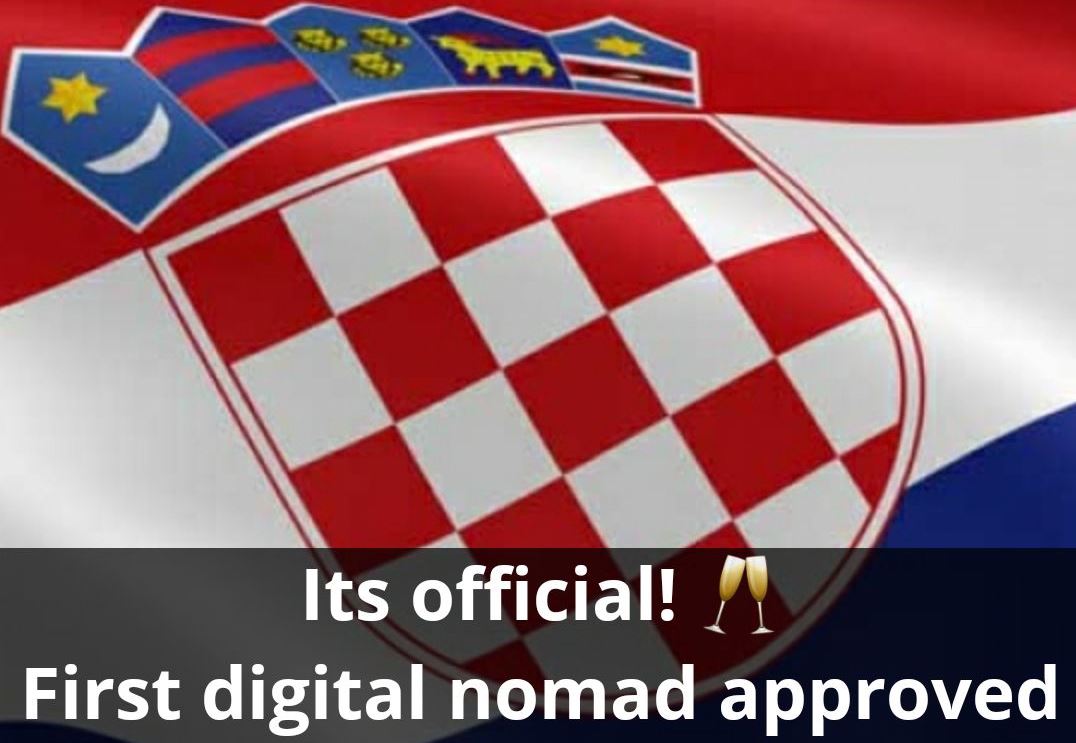
Jan's news - delightful as it was - was a little thin on detail. Who WAS this successful digital nomad visa bearer, and how did he/she do it?
Some phone calls were made, and our groundbreaking nomad was tracked down to Istria, and the town of Labin. Not only that, but Melissa Paul was more than delighted to tell her story and explain in great detail the process and the documentation required.
Melissa Paul is a brand storyteller, social media manager, and blog editor for design, travel, and lifestyle businesses.
Raised in Southern California, Melissa she was born craving adventure and kept traveling east to find it. From the mountains of Arizona to the big cities of Los Angeles, New York and Philadelphia, Melissa managed to get all the way to Croatia, first landing on the island of Krk before falling in love with the hilltop artist town of Labin, Istria. In the six years she’s called Croatia home Melissa has renovated an old stone house and learned the benefits of slowing down to enjoy the beauty of everyday life in Croatia.
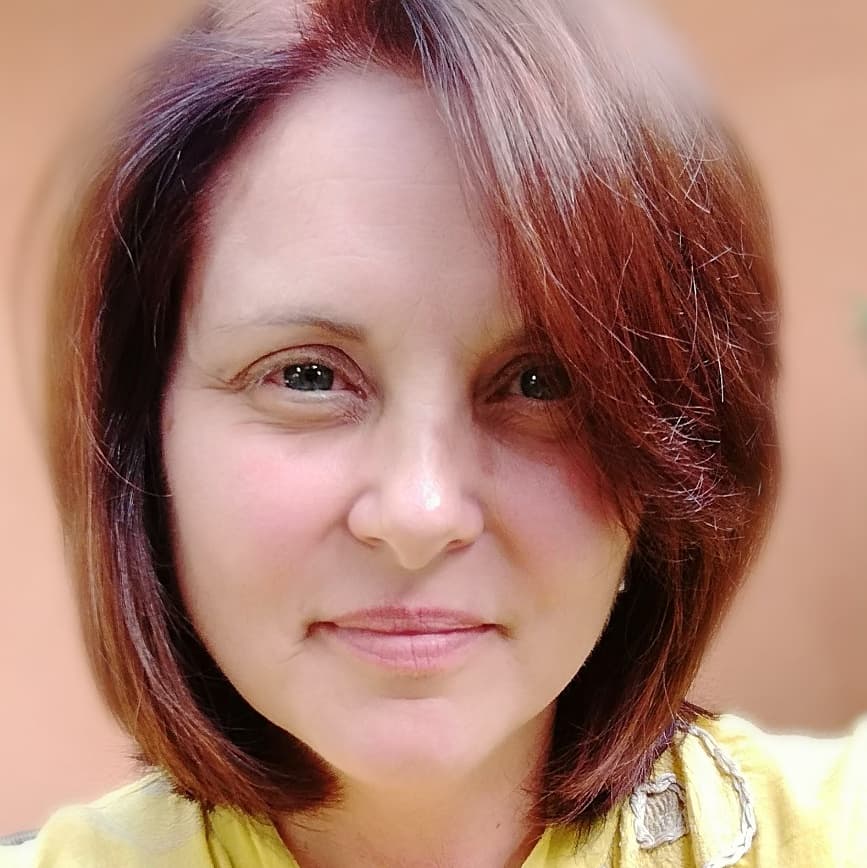
1. Let's start at the beginning. Why Croatia? What are you doing here and how long have you been here?
I came to Croatia in 2014 with my then husband, seeking a slower lifestyle in his parents’ home country. We divorced in early 2018, but I couldn’t imagine leaving my home, neighbors, and friends in Croatia!
2. As an American, you obviously have residency issues without the digital nomad visa. What was your particular situation?
Yes, it can be, and has been, challenging for third-country nationals. Originally, as a spouse of a citizen I was granted a 5-year temporary stay visa. Then, the moment our divorce (which was brought here in HR) was final, that visa also terminated. But, with the help of an excellent attorney, the Ministry gave me permission to finish my existing 5-year visa. (there are provisions in the law for this situation if you have been married and have lived in Croatia together for at least 3 years full-time). Next, I applied for an extension on that visa using ownership of my home as the reason. I was granted that extension for one-year.
This past summer, when I read about the potential for a Digital Nomad Visa, I got excited as I realized that not only do I qualify as a digital nomad, but it could be my only way to stay! But this past October, when it was time again for me to reapply for another stay visa, the Digital Nomad Visa was not enacted. I had no options available to me but to apply for humanitarian reasons. The fear was real, with COVID out of control around the globe, where would I be able to go? Even returning to the United States was not comforting. Of course, to find a way to stay in my beautiful, much safer Istra was my ultimate goal!
3. I understand that the suggestion of you applying for the digital nomad visa came from a rather unusual proactive source - the Croatian police in Zagreb. Tell us about that.
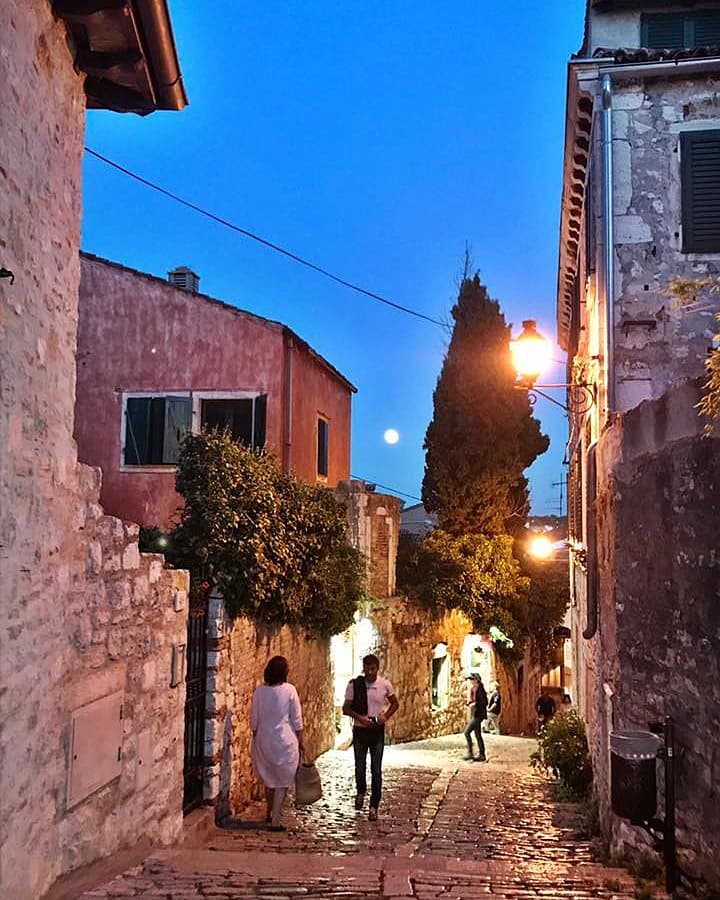
I took the suggestion of many local friends, one of whom has a friend in MUP Zagreb, and applied with letters from neighbors, local businesses I had helped, and even my local Catholic church. All to show that I had become a part of the community around me. But to no avail. I learned just days before my current visa expired that this humanitarian reason was not enough. I was denied. But in that “decision” from the Ministry in Zagreb was their suggestion that I reapply quickly (within 36 hours) using the new Digital Nomad Visa option as they could see that I qualified. Sadly, I was not given that letter to show you as it was an internal document from Zagreb to Labin MUP, but I was shown the section that offered the exact paragraphs in the Alien Act that were recommended.
4. Now - and I want you to give us as much detail as possible as there is a LOT of interest in this (you will forever be known as First Nomad Visa Lady...), take us through the process of what happened when you went to apply.

Okay, these details are spread about here in different answers. The documents I needed to provide:
1) Completed Form 1A provided by the MUP office, noting the reason of requested temporary stay as DIGITAL NOMAD, and the length of requested stay;
2) OIB (personal identification number);
3) Valid Passport that shows it is active beyond the timeframe requested in my visa application;
4) Written statement from me that I am a Digital Nomad with a company/work/clients outside of Croatia, why I want to stay/work in Croatia, how long I have been a digital nomad and any detail about my services. Specifically, I was told to reference “communications” and “technology” in my statement as services I provide as well as where the company I own is registered; and offering any detail about the names and locations of the companies I work with. This document was written by me in English but professionally translated into Croatian, then my signature was notarized by a local, Croatian notary;
5) Since I own my company (US-based) servicing clients in Mexico and the US, I was asked to provide a copy of my business registration, articles of incorporation, and proof that the company was active and in good standing. The latter was obtained online from the US state in which I originally incorporated my business in;
6) Written statement of some form from my employer, in this case, an Employment Agreement from my own company, stating that I work for the company, what role I service, what my annual salary is, and the term of my contract. This agreement needed to be stamped with the official company seal. This document was written by me in English but professionally translated into Croatian, then my signature was notarized by a local, Croatian notary;
7) Proof of health insurance coverage for the length of the visa term requested. In my case, I went to the HZZO office and got a statement from them that I was paid up. Otherwise, proof of the foreign health insurance coverage is required;
8) Proof of minimally 28,800 kuna sitting in my bank account at the time of application. Better, of course, if this was shown in a Croatian bank account. Otherwise, a statement from the foreign bank on their letterhead that this amount is in the account.
5. How long did the process last and what did it cost?
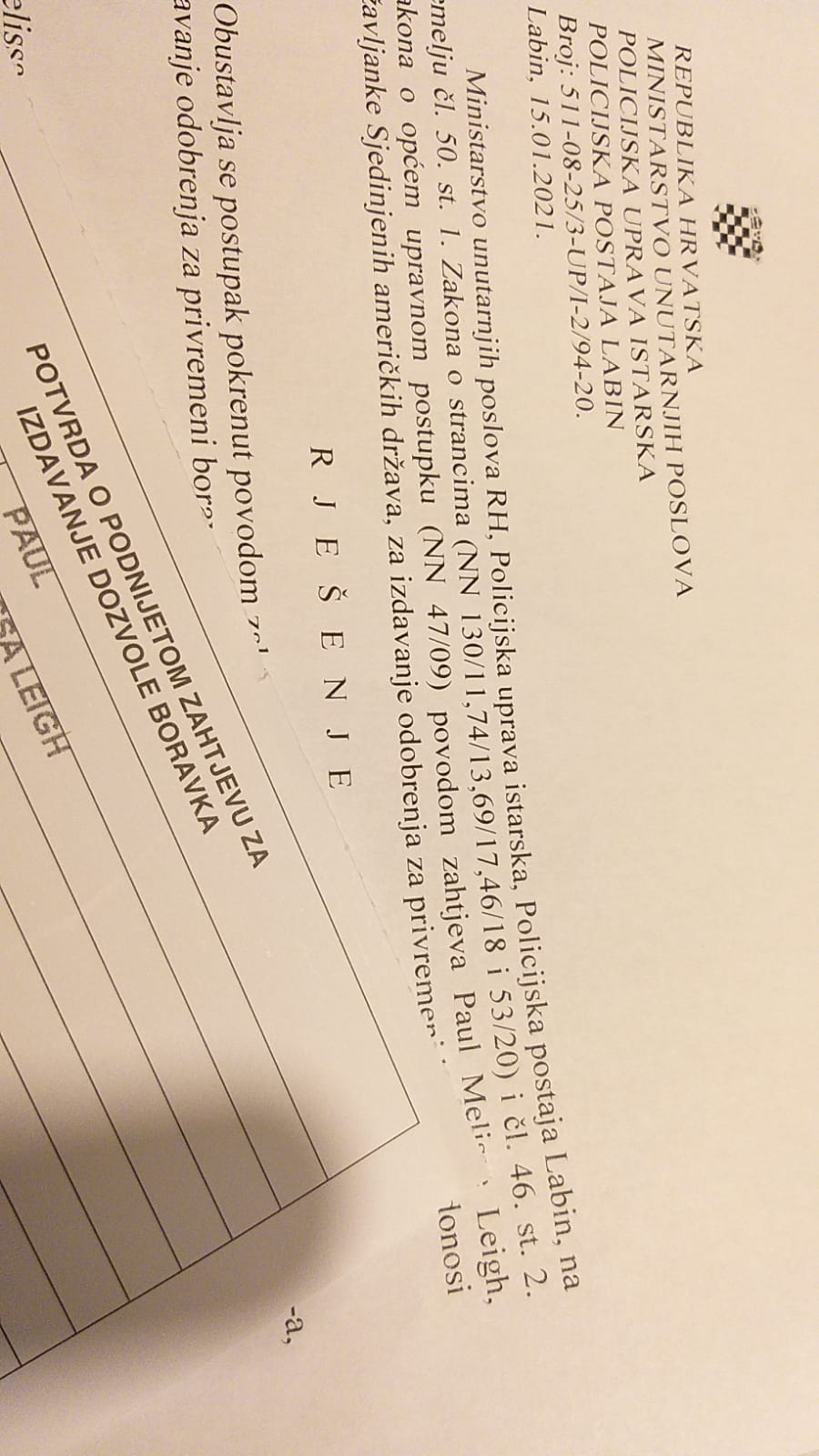
I applied in mid-November 2020 for my Temporary Stay and received a stamped letter from MUP Labin that the application was received and in process. On January 11th, 2021, I received a call at my home telling me I was denied and should come to their office in the police station immediately to discuss other options. I was told to bring a friend who spoke Croatian. I was there in an hour and they saw me immediately. I was shown the decision referenced above and it was read by my friend, and the suggestion to apply as a Digital Nomad was explained in detail. I was told I needed to get all the required documents back to MUP as soon as possible, and before my current visa expired in 4 days. I returned with all documents and ID/Passport photo. It was approved and I was given the decision, fee requirements and tax stamp requests. Tax stamps of 35 kuna were required and I paid 590 kuna for the visa application.
6. Is it actually a visa? Do you have a stamp or piece of paper you could share with us?
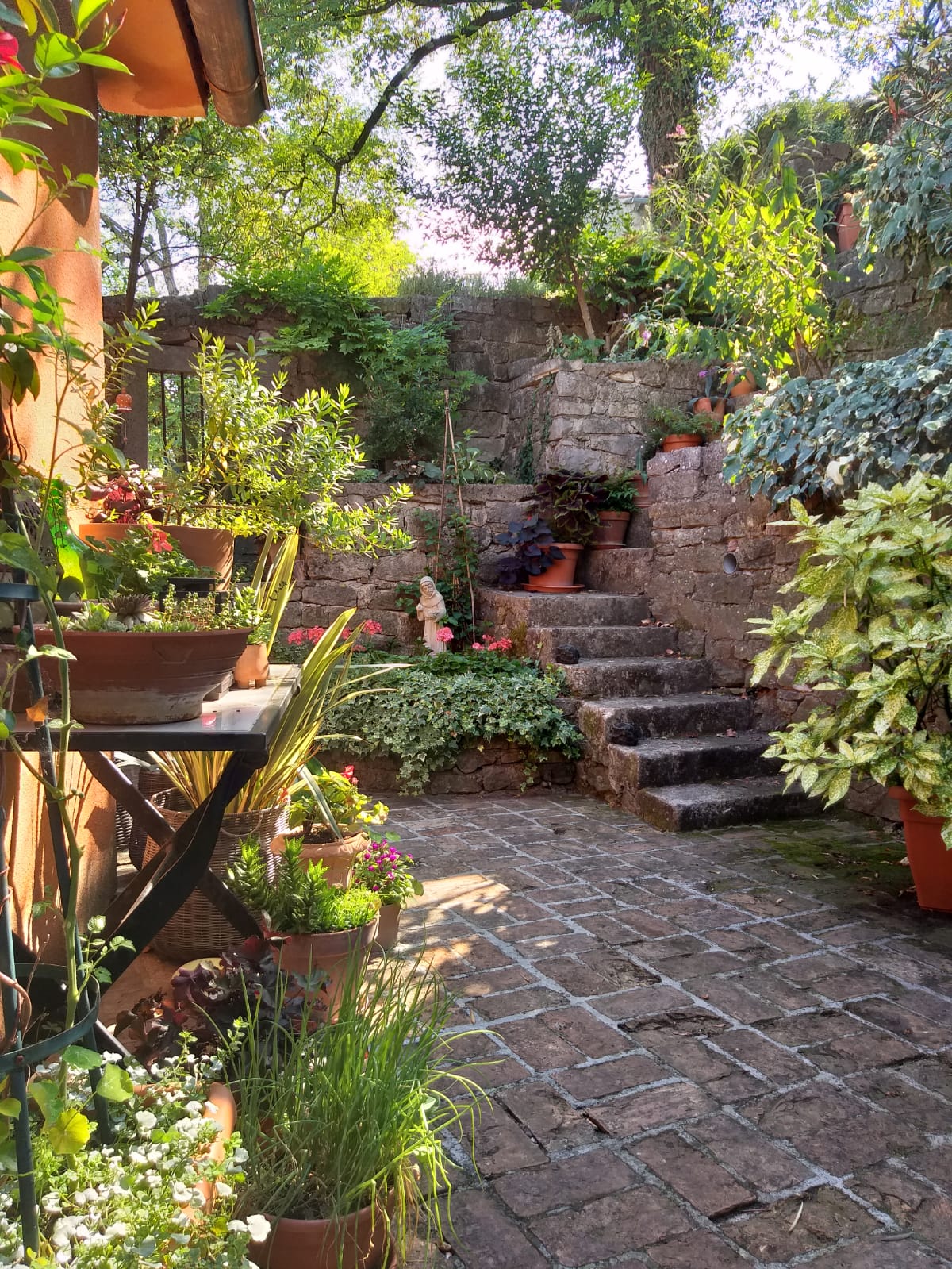
It is a reason to get a Temporary Stay Visa. So, the only document I have is the Rjesenje (decision) stating it was approved and the tariff stamp (tax stamp) of 35 kuna was due. Once I showed receipts from my bank that I paid the fee and brought back the tax stamps (available at a local Tisak) I was given a temporary white ID card and told to return in 3-4 weeks for the official card with photo.
7. When did you realise that you had become First Nomad Visa Lady - the first person to get the Croatian digital nomad visa?
My dear friend Isabel Putinja told me I must be the first, but I didn’t believe her! And then today I got a call from the Ministry in Zagreb who told me the article in TCN was about me… they asked if I would give them permission to use my name, etc.
8. Tell us how you feel now that you have it, and what are the exact conditions?
How I felt was GREAT RELIEF! To have the chance to stay here in Croatia for another year, and to not have to leave my home, my friends and neighbors, is amazing! Not to mention all the added complications COVID brings… I really have made my home here in Istria, but to have the opportunity to stay here while working remotely, is a gift. Truly! I have been a digital nomad for years and whether or not I own my home doesn’t negate the fact that I work for foreign companies while living on the other side of the world from them.
I have a new Privremeni Boravak for 12 months, which is the length of the DNVisa. It cannot be renewed or extended. When it expires, I either must have a stalni boravak (permanent residence) in place, a sexy Croatian or EU husband, or live out of Croatia for six months. (well, 3 months out, 3 months in as a tourist).

9. How have your plans changed now with regard to your stay in Croatia?
Getting my new temporary stay with the digital nomad reason means I can continue to write about Istria and Croatia, a personal project in the works for some time now. BUT, it affords me the opportunity to get a permanent stay visa as you must have one while the other is in process!
10. What advice do you have for others who are also looking to apply? What should they take with them to the police station?
Take a lot of patience with you, each time you go! And, someone who speaks fluent Croatian, as beginner’s Croatian is not enough for when faced with bureaucratic hurdles to jump! The best language is a smile, I found, but when I left frustrated I would be reminded that this is what it is, for everyone, and that it is not personal. I also believe going with everything copied already, translated and notarized is super helpful to speeding things up.
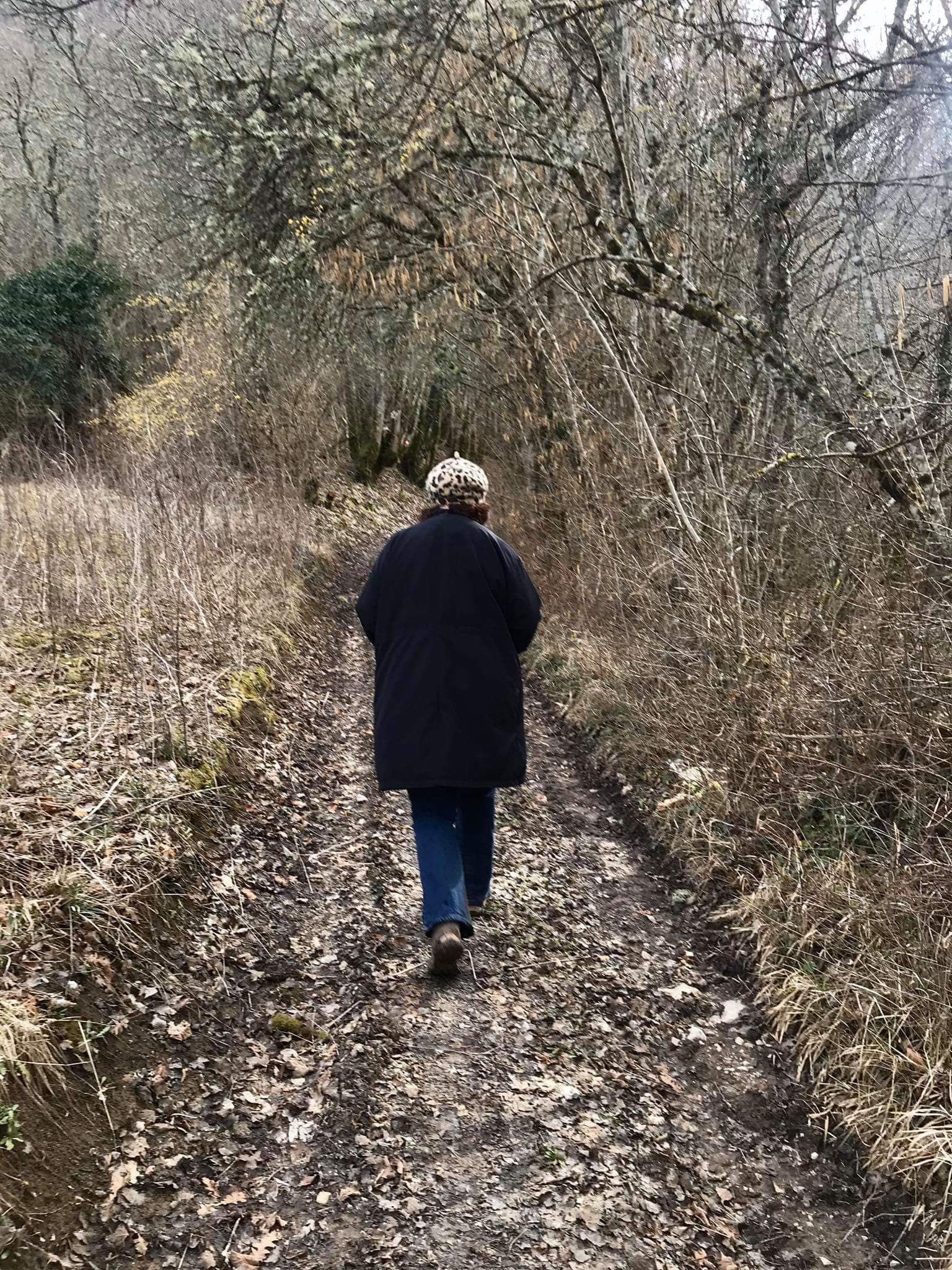
Fabulous stuff, and thanks, Melissa, for going into so much detail. You can follow Melissa Paul, Croatia's First Nomad Visa lady, on Instagram.
As I wrote in the earlier piece today announcing the first visa, the finishing touches are being applied to the process, including online registration forms. I would expect this all to be in place by the end of the first quarter of 2021, quite probably next month. We will bring you the latest in the dedicated TCN digital nomad section.
If you are applying for a digital nomad visa via your local police station and would like to share your experiences, please contact us at This email address is being protected from spambots. You need JavaScript enabled to view it. Subject Nomad Visa.



